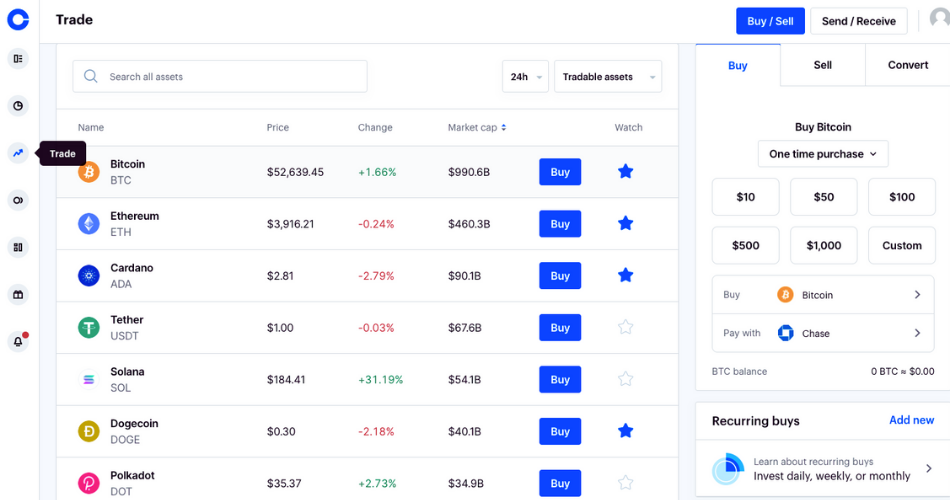What’s the fastest & Safest way to buy bitcoin ?
If you are new to bitcoin and crypto, it can be difficult to understand its value. here’s a brief guide on how to buy and invest in Bitcoin and other cryptocurrencies like Dogecoin, Solana and Ripple.
There are a lot of different ways you can get bitcoin, because it’s just a form of money after all.
Some people earn it by completing a job or a task, other people mine it using special computers that solve extremely complex computational math problems, but most people just buy bitcoin on a crypto exchange platform like Coinbase or Gemini. The same way you would buy a stock on a stock exchange like Robinhood.
Depending on your needs you will have to decide wether you want to use a centralized or Decentralized exchange. Below you will find out the main difference between these two options.
The investing information provided on this page is for educational purposes only. This site does not offer advisory services or brokerage services, and investors are not advised to buy or sell any particular stock.
When you use crypto, say Goodbye overdraft fees, hello flexible savings !

First thing first: you need to get a bitcoin wallet !
In order to buy bitcoins, you’ll need a Bitcoin “wallet”. A Bitcoin “wallet” is a virtual storage centre which stores the public and/or private keys for cryptocurrency transactions, just like your physical wallet holds your cash and cards.
Types of Wallets and Their Differences.
After buying crypto, you’ll need a wallet to store it securely.
- Hot Wallets (online):
Examples: Coinbase Wallet, MetaMask.- Convenient and easy to access.
- Ideal for active trading.
- Cold Wallets (offline):
Examples: Ledger, Trezor.- Best for long-term storage and security.
“Hot wallet”: also called software wallet. It’s a form of digital storage you can access on your computer or mobile device through the internet. Since hot wallets are connected to the Internet, they are less secure from hackers than cold wallets. Popular hot wallets include Coinbase, Kraken, binance and Gemini.
“Cold wallet”: also called offline wallets or hardware wallet, they act like a mini vault. These use special “keys” that only you have access to, which adds an extra layer of protection for your crypto (this is also called “cold storage”). Popular cold wallets include Trezor and Ledger
If you’re an everyday user, online exchanges are your best option, as long as you don’t mind going through an ID verification and trust a third party to hold your funds. However, some people believe that this eliminates the whole point of Bitcoin and its anonymity. This goes against the principles of “decentralized”.
Now that you understand what a Bitcoin wallet is, you’re probably wondering how you actually find the wallet that’s best for you.
You can read this article to learn more about the best crypto exchanges we found on the market so far.
Some of the most reliable, trusted, and secure exchanges include:
The best place to get started with bitcoin !
The easiest way to buy Bitcoin, Dogecoin, Solana and other Cryptocurrencies is to purchase it through an online exchange. They make it so easy for anyone to buy, sell, send, receive and store it without having to hold it yourself.
There are a couple Crypto exchanges that are pretty good and safe out there like, but they all have their own features so it really depends on your needs as an investor.
What is a centralized crypto exchange ?
A centralized cryptocurrency exchange is a platform where you can buy, sell and trade digital assets. In this case, you must trust a third party to monitor the transaction and secure the assets on your behalf, whether you’re the buyer or seller. There is no tracking of their deals on the blockchain.
Just know that Verification of your personal information is required for such exchanges.
Platforms: Coinbase / Binance / Kucoin / Gemini
What is a decentralized crypto exchange ?
A decentralized cryptocurrency exchanges work like centralized one, except they don’t rely on a third party to hold your assets. All funds for this exchange are kept on the blockchain.
These platforms allow peer-to-peer (P2P) trading, which typically uses assets, proxy tokens, or an escrow system, rather than IOU-based system like those used by centralized crypto exchanges.
Platforms: Exodus / Uniswap / Kyber / Bisq
1. Understanding Cryptocurrency Exchanges
- Centralized Exchanges (CEXs):
These are run by companies, making them user-friendly and ideal for beginners. Popular CEXs include:- Coinbase (great for U.S. users, intuitive for beginners).
- Binance (wide variety of coins and low fees).
- KuCoin (excellent for altcoins).
- Bybit (known for advanced trading tools).
- Decentralized Exchanges (DEXs):
DEXs let you trade directly from your wallet without needing to sign up. They’re popular for privacy and unique tokens. Examples:- Uniswap: Best for Ethereum-based tokens.
- PancakeSwap: Perfect for Binance Smart Chain tokens.
What is the best platform for beginners ?
Coinbase is probably the most well-known cryptocurrency exchange for newbies.
The platform has been used by Bitcoin early adopters since 2012, however it gained mainstream attention in 2021 when it became the first crypto exchange listed on the Nasdaq. The company now has more than 56 million registered users who trade over $300 billion worth of cryptocurrency each quarter.
According to crypto data firm CoinMarketCap, it has the third-highest trade volume among all crypto exchanges.
Why Coinbase ?
Coinbase’s user-friendly tools and slick design brought in traders who wanted to buy and sell cryptocurrency easily. Despite its popularity, the fees are a little high compared to other exchanges and Hawaii residents cannot sign up.
Being one of the best Crypto exchanges for Beginners, it offers over 30 cryptocurrencies to buy, sell and trade. Here’s a list of cryptos you can start trading on Coinbase:
- Bitcoin (BTC)
- Ethereum (ETH)
- Cardano (ADA)
- Solana (SOL)
- Ripple (XRP)
- Shiba Inu (SHIB)
- Dogecoin (DOGE)
- Litecoin (LTC)
- Uniswap (UNI)
- Chainlink (LINK)
- Stellar Lumens (XLM)
- Polygon (MATIC)
- Ethereum Classic (ETC)
- Zcash (ZEC)
- EOS (EOS)
- Kyber Network (KNC)
- Loopring (LRC)
- OMG Network (OMG)
- Ren (REN)
- Ox (ZRX)
- Dash (DASH)
- Cosmos (ATOM)
- Ankr (ANKR)
- Maker (MKR)
- And more…

You can also use Coinbase to convert one cryptocurrency into another, or to send and receive cryptocurrency from other wallets.
It is also similar to stock trading apps that show current cryptocurrency prices and trends, your portfolio of holdings, and news stories about the industry. It’s very useful if you are trying to become a crypto trader.
HOW TO GET STARTED ?
Creating a Coinbase account is easy, but it requires some information, such as your legal name, home address, date of birth, last four digits of your Social Security number, and how you plan to use the platform. It’s just to comply with federal law.
Here’s How To Begin :
- Download the Coinbase app for iPhone or Android.
- Open it up and tap “Get Started.”
- Create an account with your email address and tap “Start.”
- Verify your email by tapping a link that was sent to your inbox.
- Enter your phone number and verify it by entering a code that was texted to you.
- Enter in your name, date of birth and last four digits of your Social Security number. Note: you need to be at least 18 years old to use it.
- Enter your address.
- Choose how you will use Coinbase, either for investing, online payments, online purchases or for investing in other exchanges.
- Confirm your source of income.
- Tap “Let’s Go.”
- Now you’ll start to link your bank account. Search for your bank.
- Log into your bank account with the username and password you normally use for banking.
- Select the bank account you want to link to Coinbase for purchases and tap “Continue.”
That’s it. You will now be taken to Coinbase’s main page, where you can start Trading cryptocurrencies.

SOME RESTRICTIONS MAY APPLY !
Different coins have different trading restrictions and withdrawal limits.
There are some cryptocurrencies that can only be exchanged for certain fiat currencies like the U.S. dollar or converted to/from other cryptocurrencies. Depending on where you live, you may also be restricted from trading certain coins.
The Coinbase website provides a summary of these restrictions for each of its supported cryptocurrencies.
COINBASE FEES !
Morningstar reports that Coinbase earned nearly $3 billion in revenue over the past 12 months mainly by charging a bunch of fees.
It’s not necessarily a bad thing, most crypto exchanges charge fees, so it really depends on what you looking for in an exchange. You might want to use platforms like Binance or Bittrex if you looking for low-fees exchanges, but they’re designed for more advanced crypto traders.
Log into your Coinbase account and pick the amount you want to buy, say $100 worth. It uses the Coinbase Pro exchange rate to determine what it is worth in Bitcoin. Coinbase then includes a spread fee it refers to as the “consumer exchange rate.” This is the difference between what Coinbase pays to acquire a crypto and what it resells it to you for.
There may be padding on either end of the transaction to help Coinbase make a profit. You can always lower those fees by switching to Coinbase pro.
For American buyers, the flat fee with coinbase looks like this:
- Transactions less than or equal to $10, the fee is $0.99.
- Transactions more than $10 but less than or equal to $25, the fee is $1.49.
- Transactions more than $25 but less than or equal to $50, the fee is $1.99.
- Transactions more than $50 but less than or equal to $200, the fee is $2.99.
After exceeding $200, the fee structure changes to be percentage based, determined by how you pay for the crypto:
- 1.49% for U.S. bank accounts and Coinbase USD Wallets.
- 3.99% for debit card or PayPal.
Fees for purchases above $200 may run up to 1.5% of any transaction for a minimum fee of $0.55.
MAKE THE RIGHT DECISION FOR YOU !
When it comes to choosing the right exchange platform for you, you have to explore all your options to make the right decision. At the end of the day it really depends on your needs and what you want to do with your crypto assets.
Coinbase is one of the best exchange for beginners, but it is centralized and has high fees compare to some other exchanges, which could be an issue for more advanced traders.
You can read this article to see the main differences and compare the most popular Crypto exchange platforms to help you decide which one works best for you.

WHAT MAKES BITCOIN RELEVANT ?
- When you buy, send or receive Bitcoin and other Cryptocurrencies you get a public key which you can think of as a key that opens a virtual safe that gives you access to your money.
- Anyone can send Bitcoin to you via your public key, but only the holder of the private key can access bitcoin in the “ Virtual safe” once it’s been sent.
- There are several ways to store bitcoin both online and offline. The simplest solution is an online wallet like Coinbase or Gemini which are really easy to use especially for beginners. But you can also keep your bitcoins and other cryptos in a hardware wallet (offline-often called “cold storage”) like Ledger. It is by far the safest way to hold cryptos.
PLEASE remember that popular services like Paypal, Venmo and Robinhood allow you to purchase bitcoin and a couple of other cryptos quickly with little technical knowledge. But most of these online services have their own wallet integrated into their website or mobile app, which means that you won’t be the owner of the wallet.
you will have to trust the company to secure, protect and hold your cryptos for you.
In other words, they’ll have control over your assets.

You can check other platforms to compare them to help you get the one that works best for your needs.



